Obituary: Jean-Marie Le Pen, founder of French far right

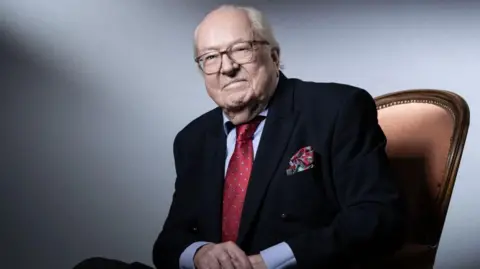 Getty Images
Getty ImagesJean-Marie Le Pen founded France’s far right in the 1970s and mounted a strong challenge for the presidency. But it was only when he handed the reins on to his daughter that his rebranded party caught sight of power.
He has died aged 96, his family has said.
Le Pen’s supporters saw him as a charismatic champion of the every man, unafraid to speak out on hard topics.
And for several decades he was seen as France’s most controversial political figure.
His critics denounced him as a far-right bigot and the courts convicted him several times for his radical remarks.
A Holocaust denier and an unrepentant extremist on race, gender and immigration, he devoted his political career to pushing himself and his views into the French political mainstream.
The so-called Devil of the Republic came runner-up in the 2002 French presidential election, but he was resoundingly defeated. That devil had to be taken out of the National Front if it was going to progress further – a process that became known as “de-demonisation”.
For his part, the five-time presidential candidate – who started his political life fighting Communists and conservatives alike – described himself as “ni droite, ni gauche, français” – not right, not left, but French.
And all the French had their opinions about Le Pen. In 2015, Marine Le Pen expelled her father from the National Front he had founded four decades previously.
“Maybe by getting rid of me she wanted to make some kind of gesture to the establishment,” he would later tell the BBC’s Hugh Schofield.
“But think how much better she would be doing if she had not excluded me from the party!”
Pupil of the Nation
Jean-Marie Le Pen was born in the small Breton village of La Trinité-sur-Mer on 20 June 1928.
He lost his father at 14 when his fishing boat hit a German mine. Le Pen became a Pupille de la Nation – the term French authorities use for those who had a parent wounded or killed in war – entitling him to state funding and support.
Two years later he tried to join the French Resistance, but was turned down. He wrote in an autobiography that his first “war decoration” was a “magisterial slap” from his mother, when he came home and told her what he had tried to do.
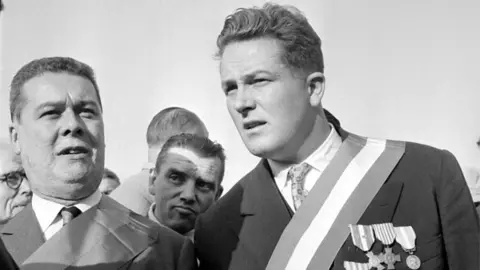 Getty Images
Getty ImagesIn 1954, Le Pen joined the French Foreign Legion. He was posted to Indochina – modern-day Vietnam, Cambodia and Laos, at that time controlled by France – then two years later to Egypt, when France, the UK and Israel invaded the country in a bid to take control of the Suez Canal. Both conflicts ended in French defeat.
But it was his time in Algeria that would define so much of his politics, and his career.
He was posted there as an intelligence officer, when Algerians were fighting a brutal but ultimately successful war of independence against Paris.
Le Pen saw the loss of Algeria as one of the great betrayals in French history, fuelling his loathing of World War Two hero and then-President Charles de Gaulle, who ended the war for the colony.
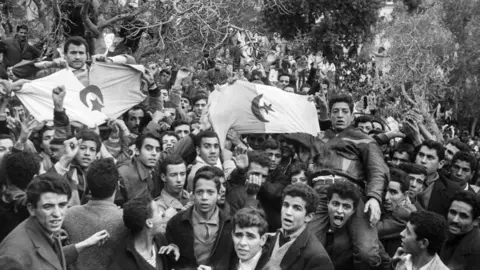 Getty Images
Getty ImagesDuring that independence war, he allegedly took part in the torture of Algerian prisoners, something he always denied.
Decades later he would unsuccessfully sue two French newspapers, Le Canard enchaîné and Libération, for reporting the allegations.
Political rise
Le Pen was first elected to the French parliament in 1956 in a party led by militant right-wing shopkeepers’ leader Pierre Poujade. But they fell out and Le Pen briefly returned to the army in Algeria. By 1962 he had lost his seat in the National Assembly and was to spend the next decade in the political wilderness.
During a spell in 1965 as campaign manager for far-right presidential candidate Jean-Louis Tixier-Vignancour, Le Pen defended the war-time government of Marshal Pétain, who supported the occupying Nazi German forces.
“Was General de Gaulle more brave than Marshal Pétain in the occupied zone? This isn’t sure. It was much easier to resist in London than to resist in France,” he said.
It was during that election campaign that he lost the sight in his left eye. For several years he wore an eye patch – giving rise to stories of a political punch-up. In reality, he had lost it while putting up a tent.
“While wielding the mallet… a shock in my eye, I have to be hospitalised. Retinal detachment,” he would write in a memoir years later.
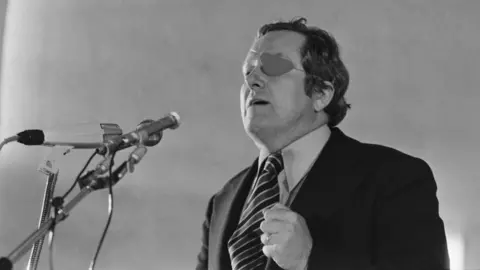 Getty Images
Getty ImagesIt was not until 1972 that Le Pen’s political ascent truly began. That year he set up the Front National (FN), a far-right party created to unify the nationalist movement in France.
At first, the party had little support. Le Pen ran for the presidency in 1974 for the FN, but won less than 1% of the vote. In 1981 he failed to even get enough signatures on his nomination form to stand.
But the party gradually attracted voters with its increasingly strident anti-immigration policy.
The south of France in particular – where large numbers of North African immigrants had come to settle – began to swing behind the FN. In the 1984 European elections, it gained 10% of the vote.
Le Pen himself won a seat in the European Parliament, which he would hold for more than 30 years.
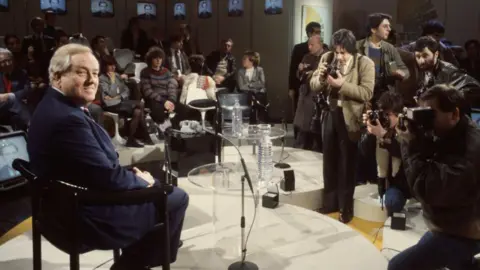 Getty Images
Getty ImagesAs an MEP he voiced his hatred of the European Union and what he saw as its interference in French affairs. He would later call the euro “the currency of occupation”.
But his rising political fortunes did not stop him giving voice to shocking views.
In a notorious interview in 1987, he played down the Holocaust – Nazi Germany’s murder of six million Jews. “I do not say that the gas chambers did not exist. I never personally saw them,” he told an interviewer. “I have never particularly studied the issue, but I believe they are a point of detail in the history of World War Two.”
His comments about le détail would dog the rest of his career.
Regardless of the controversy, his popularity grew. In the 1988 presidential election, he took 14% of the vote. That figure rose to 15% in 1995.
Then came 2002. With many mainstream candidates dividing opposition support, Jean-Marie Le Pen squeezed into the second and final round of the presidential election.
The result sent shockwaves through French society. More than a million protesters took to the streets to oppose Le Pen’s ideas.
The far-right politician inspired such revulsion from the majority that parties across the political spectrum called on their supporters to back President Jacques Chirac for a second term. Chirac took 82% of the vote, the biggest victory in French political history.
Split with his daughter
Le Pen would run again for the presidency, in 2007, but by then his political star had waned. Le Pen, then the oldest candidate to ever contest the presidency, came fourth.
 Getty Images
Getty ImagesWithin months of that vote, newly elected President Nicolas Sarkozy – who Le Pen had attacked as being “foreign”, because of his Greek, Jewish and Hungarian ancestors – seized on the FN’s main campaign themes of national security and immigration in legislative elections, and stated openly that he intended to go after FN votes.
It swept the rug out from under the FN. Le Pen’s party failed to pick up a single seat in the National Assembly and, dogged by financial problems, he announced plans to sell his party headquarters outside Paris.
In 2011, he resigned as party leader and was replaced by his daughter, Marine.
Father and daughter fell out almost immediately. Marine le Pen consciously moved the party away from her father’s more extreme policies, to make it more attractive to Eurosceptic mainstream voters.
Then the relationship shattered irreparably.
In 2015, Jean-Marie Le Pen repeated le détail, his Holocaust denial, in a radio interview. After months of bitter legal wrangling, FN party members eventually voted to expel their own founder.
Two years later, during her own presidential campaign, Marine changed the party name to Rassemblement National, or National Rally.
Her father condemned the move as suicidal.
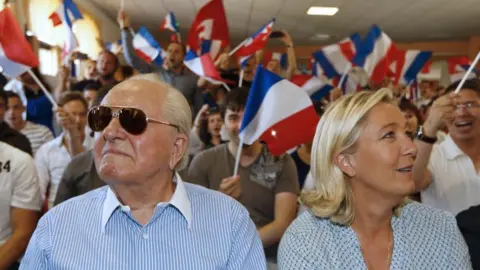 Getty Images
Getty ImagesBut Jean-Marie Le Pen remained unrepentant.
“The détail was in 1987. Then it came back in 2015. That’s not exactly every day!” he told the BBC in an interview in 2017.
He even proved sanguine about the rifts with his family – at least publicly.
“It is life! Life is not a smooth tranquil stream,” he said.
“I am accustomed to adversity. For 60 years I have rowed against the current. Never once have we had the wind at our backs! No indeed, one thing we never got used to was the easy life!”
World News || Latest News || U.S. News
Source link




